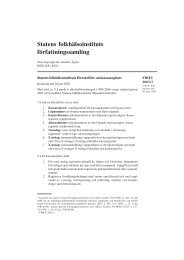Gambling motivation and involvement: A review of social
Gambling motivation and involvement: A review of social
Gambling motivation and involvement: A review of social
You also want an ePaper? Increase the reach of your titles
YUMPU automatically turns print PDFs into web optimized ePapers that Google loves.
in order to maximize utility from smoking lots <strong>of</strong> cigarettes as soon as the price has<br />
been lowered. Conversely, a rise in price in the remote future will prompt the rational<br />
addict to decrease his or her stock <strong>of</strong> addictive capital right away.<br />
Myopic <strong>and</strong> rational addictions have different policy implications. Myopic addicts<br />
act on the basis <strong>of</strong> imperfect information <strong>and</strong> utility calculus <strong>and</strong> would therefore<br />
benefit from being educated about the adverse future consequences <strong>of</strong> being addicted.<br />
Rational addicts are assumed to have full knowledge <strong>of</strong> what is at present known<br />
about potential negative consequences. Educating them about the dangers <strong>of</strong> addiction<br />
<strong>and</strong> the various ways to stop abusing is thus useless unless br<strong>and</strong> new information<br />
is presented, for instance, from addiction or treatment research. Efforts to make<br />
rational addicts quit are misguided, since they themselves have chosen to be addicts<br />
<strong>and</strong> would suffer even more if they stopped using the addictive good. Policy measures<br />
should therefore be concentrated on correcting negative externalities, such as preventing<br />
drunken drivers from harming others by causing road accidents.<br />
The three economic studies on gambling mentioned above [177–179], all claim<br />
to present evidence suggesting that gambling – entering lotteries <strong>and</strong> horse betting<br />
– is addictive <strong>and</strong> that addiction is rational. They draw this conclusion from<br />
econometric analyses that, among other things, appear to show that gamblers react<br />
to expected price changes in the remote future, which is the kind <strong>of</strong> price elasticity<br />
characteristic <strong>of</strong> rational addiction. However, since the theory <strong>of</strong> rational addiction<br />
as originally formulated <strong>and</strong> used in these studies has been subject to devastating<br />
critique, by Elster [185] for example, these results should be viewed with great caution.<br />
One study, for instance, tested the approach on the consumption <strong>of</strong> a variety<br />
<strong>of</strong> consumer goods <strong>and</strong> arrived at the incredible conclusion (unless the cumbersome<br />
notion <strong>of</strong> beneficial addiction is accepted) that milk is more addictive than cigarettes<br />
[176]. This test thus suggests that the theory <strong>of</strong> rational addiction is flawed. That is<br />
also the opinion <strong>of</strong> numerous scholars in the fields <strong>of</strong> addiction <strong>and</strong> gambling studies<br />
[56], including the present author.<br />
RELEvancE tO pRObLEm GambLinG StudiES<br />
There is reason to assume that the theory <strong>of</strong> rational addiction is fundamentally<br />
flawed. It is thus questionable that the theory is <strong>of</strong> any relevance to problem gambling<br />
studies.<br />
The leisure gambler<br />
Leisure studies incorporate perspectives from economics, sociology, psychology,<br />
<strong>and</strong> human geography. The focus <strong>of</strong> this multidisciplinary field <strong>of</strong> research is on<br />
people’s leisure choices <strong>and</strong> behavior. Since people do quite a lot <strong>of</strong> different things<br />
in their free time, the activities studied are varied, such as sports, tourism, nature<br />
36 G A M B L I N G M O T I VAT I O N A N D I N V O LV E M E N T

















